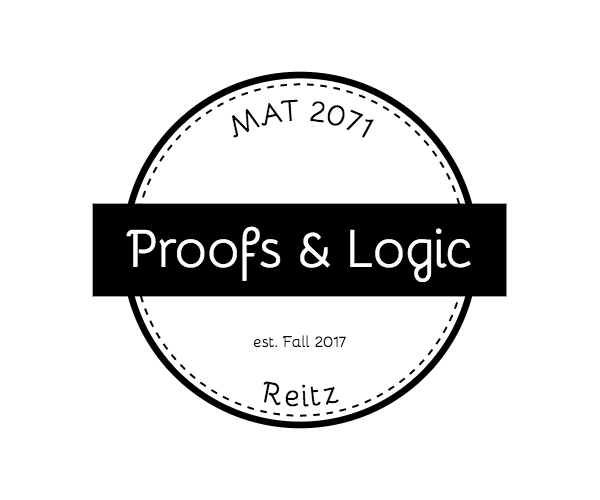Tag: calculus
Handy Links
 Logic on Math StackExchange
Logic on Math StackExchange
- Why can't we construct a syntactic/Herbrand universe for $\mathsf{ZFC}$? September 1, 2024As question states, I'm curious why it is that we can't carry about the operation of constructing a syntactic model off of the terms and functions of the language of a theory $T$ when the theory if $\mathsf{ZFC}$?Sho
- When does a bisimulation contain a functional bisimulation? [closed] August 31, 2024Define a bisimulation $\theta$ from a graph $(V_1,E_1)$ to a graph $(V_2, E_2)$ as a subset $\theta \subseteq V_1 \times V_2$ such that the following properties are satisfied: Whenever $(x_1,x_2) \in \theta$ and $(x_1,y_1) \in E_1$ then there exists $y_2 \in V_2$ such that $(y_1,y_2) \in \theta$ and $(x_2,y_2) \in E_2$. Whenever $(x_1,x_2) \in \theta$ […]polynomial connoisseur
- State True or False: If x<|y|, then |y| > |x| [closed] August 31, 2024State True or False: If $x |x|$. The answer given in my module worksheet is True, however, if I take $x = -10$ and $y = -2$, then this will not be true. $-10 < |-2| \implies -10 < 2 $(which is correct) However, $|-2| > |-10| \implies 2 > 10$ (is NOT correct) Hence, […]Harsh
- Graduate Textbook Recommendations for Second-Order Logic [duplicate] August 30, 2024I'm currently reading Bruno Poizat's A Course on Model Theory and am interested in possibly extending model theory to second-order logic. I'm looking for recommendations on graduate-level textbooks that offer a rigorous treatment of second-order logic, particularly in terms of semantics, proof theory, and its applications in model theory. Any suggestions for texts that would […]Jackson Willoughby
- Is $\Gamma \vDash B$ in propositional logic a r.e. problem? August 30, 2024One version of the compactness theorem in propositional logic is as follows: if $\Gamma \vDash B$, then there is a finite $\Delta \subseteq \Gamma$ s.t. $\Delta \vDash B$. However, this by itself does not make the reverse true. Yet, it seems to me that the reverse is true, which would then result in the equivalence: […]3-3_0-5_5-0_1-1
- Can you give me an example of an implicit use of Godel's Completeness Theorem, say for example in group theory? August 30, 2024Wikipedia says that the more general form of Godel's completeness is "used implicitly, for example, when a sentence is shown to be provable from the axioms of group theory by considering an arbitrary group and showing that the sentence is satisfied by that group." How so? Can you give me an example? EDIT: In his […]Lucas Salim
- Simplifying $(p\vee\neg q)\wedge(q\vee\neg r)\wedge(r\vee\neg p)$ [closed] August 30, 2024I recently began learning about compound propositions. How to use a sequence of logical equivalences to simplify $$(p\vee\neg q)\wedge(q\vee\neg r)\wedge(r\vee\neg p)$$ such that it becomes more straightfoward to figure out which combinations of the truth values of $p$, $q$ and $r$ make this statement True. I don't want to use a truth table, which reveals […]Nam Le
- Hilbert Style Axiomatic Proof of Transitivity of Conditional Without Using Deduction Theorem. [duplicate] August 29, 2024I am trying to demonstrate to students how useful the deduction theorem for Hilbert-Style axiomatic systems turns out to be, and to emphasize that using the deduction theorem shows us that an axiomatic proof does exist without providing us with any real idea of how that axiomatic proof would go. To this end, I wanted […]Keith McPartland
- Do zero-knowledge proofs of unprovable statements exist? [closed] August 29, 2024In other words, I'm wondering if there are statements that may be unprovable, or independent (say from the Peano Axioms), but nonetheless might still be "zero-knowledge provable" - i.e. there might still exist a ZKP of them with arbitrarily small soundness error. On a slight tangent, if someone could somehow generate a zero-knowledge proof (without […]Valerio Bertoncello
- Why the principle of duality in Boolean Algebra is right? [duplicate] August 29, 2024In class, my teacher explained the knowledge of digital circuit logic.He explained what the $principle\ of \ duality$ is, but he didn't explain the proof, and I was very interested in the proof. $principle\ of \ duality:$ Every algebraic identity of Boolean algebra remains equal if the operations(+) and ($\cdot$), and the 0 and 1 […]billwang




Recent Comments